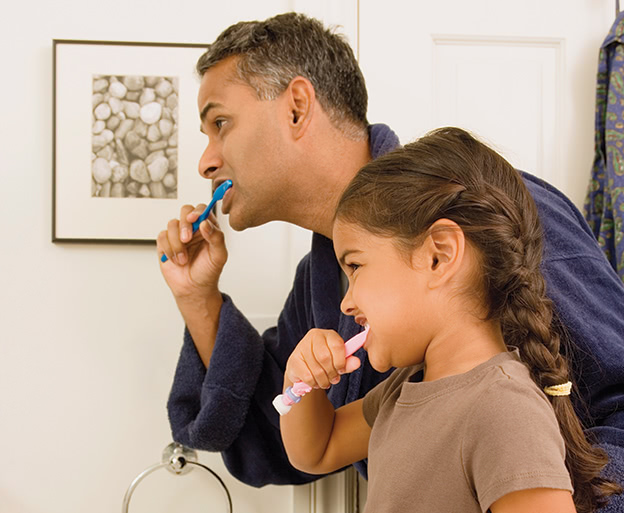
Section
Oral Health
Between about 6 months and 3 years, children get 20 baby teeth. Baby teeth help your child eat healthy foods and learn to talk and smile normally. They help the jawbone and face muscles develop.
Even though baby teeth will fall out, it’s important to take care of them. Start good dental care from birth, so your baby’s gums will be healthy and her teeth will not have decay. Healthy teeth and gums affect the health of her whole body.
Where to Find Help
Search tool for finding dentists who see children and accept Medi-Cal dental insurance.
Things You Can Do
Caring for Your Baby’s Teeth
Starting from birth, wipe your baby’s gums with a clean, damp cloth or gauze pad every day.
When your baby has her first tooth, start to brush 2 times a day with a small smear of fluoride toothpaste. Increase to a pea-sized amount of toothpaste when your child turns 3.
Ask your baby’s doctor about fluoride supplements or varnishes, starting at 6 months. They help prevent cavities.
The bacteria that cause tooth decay can spread from mouth to mouth. Do not put food, toothbrushes, pacifiers, or spoons that have been in your mouth into your baby’s mouth.
Teething
If your baby has teething pain, gently rub her gums with a clean finger or damp cloth. Or let her chew on a chilled teething ring or clean washcloth, or use a pacifier. Teething may cause a mild temperature (101° F or lower). If your baby’s temperature is higher, take her to her doctor.
Prevent Tooth Decay
Tooth decay is caused by bacteria and sugar in the mouth. To help prevent tooth decay, don’t give foods that are sticky, chewy, or sugary. Between meals, offer water to drink rather than milk, juice, or sugary drinks. Do not put your child to bed with a bottle or food. And do brush her teeth twice a day.
Good Dental Habits Last a Lifetime
Help your child learn good dental habits. When your child’s teeth come in, you will need to brush them at first. Then you will need to help until she can do it herself. This is usually not until ages 6 to 8. Remember, brushing before bedtime helps prevent cavities.
Everyone Needs Dental Checkups
Both adults and children should see a dentist every 6 months. Make your child’s first appointment when her first tooth comes in, or by her first birthday.
To find a dentist for your child, talk to your own dentist. Many dentists treat patients of all ages.

Help your child brush her teeth until she can do a good job by herself.
See the Dentist for These Tooth Problems
The most common tooth problem for children is decay (cavities). It can cause pain and infections. It can also lead to serious problems with eating, speaking, sleeping, and learning. Call the dentist if your child:
Has brown or black spots on her teeth. These can be signs of decay.
Has tooth pain.
Has a cracked or broken tooth, or other injury to the teeth or gums.